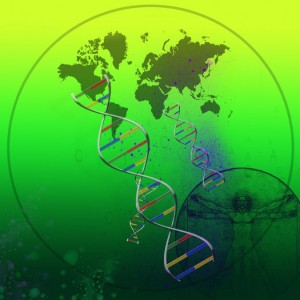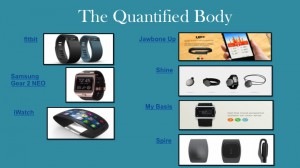Join Deepak Chopra, Rudy Tanzi, and others at the Aspen BrainLab at the Paepcke Auditorium, Aspen Institute, Aspen, Colorado. Topics to be covered:
- Creative Brain
- Impaired Brain
- Healthy Brain
- Future Brain
- And special discussion on genes
Join Deepak Chopra, Rudy Tanzi, and others at the Aspen BrainLab at the Paepcke Auditorium, Aspen Institute, Aspen, Colorado. Topics to be covered:
 By Deepak Chopra This post is part of a series in which LinkedIn Influencers analyze the state and future of their industry. I have been in the health industry for the last forty-five years. When I was doing my residency and fellowship in various Boston hospitals our main attention was on sickness. For the most part this is still the case. The health industry is essentially a sickness industry. The business of sickness is what hospitals, medical equipment makers, pharmaceutical companies and physicians and surgeons thrive on. When I finished my training I realized that focusing on sickness would never make for healthy citizens, businesses, communities or nations. I, therefore, turned my attention to prevention of disease and lifestyle changes that could not only prevent illness but also even reverse it. In the last decade or so mounting research has shown how lifestyle changes, including exercise, stress management, and diet can prevent almost ninety percent (90%) of chronic illnesses in our society. It is now known that only five percent (5%) of disease-related gene mutations are fully penetrant. In other words, the gene expression of these mutations cannot be stopped unless a future drug or technology is developed to stop that expression. In most of the other gene-related mutations related to chronic disease, lifestyle can affect gene expression. We now know that Type 2 diabetes, cardiovascular illness in general, and many types of cancer are preventable. In addition almost every chronic disease is related to inflammation in the body and can be ameliorated through —modified gene expression. The Chopra Foundation has been collaborating with various academic institutions on how meditation, restful sleep, healthy diet, emotional and social well-being, exercise, breathing techniques, and healthy relationships can change disease-related gene expression, which in turn can dynamically change how we experience health or disease.
By Deepak Chopra This post is part of a series in which LinkedIn Influencers analyze the state and future of their industry. I have been in the health industry for the last forty-five years. When I was doing my residency and fellowship in various Boston hospitals our main attention was on sickness. For the most part this is still the case. The health industry is essentially a sickness industry. The business of sickness is what hospitals, medical equipment makers, pharmaceutical companies and physicians and surgeons thrive on. When I finished my training I realized that focusing on sickness would never make for healthy citizens, businesses, communities or nations. I, therefore, turned my attention to prevention of disease and lifestyle changes that could not only prevent illness but also even reverse it. In the last decade or so mounting research has shown how lifestyle changes, including exercise, stress management, and diet can prevent almost ninety percent (90%) of chronic illnesses in our society. It is now known that only five percent (5%) of disease-related gene mutations are fully penetrant. In other words, the gene expression of these mutations cannot be stopped unless a future drug or technology is developed to stop that expression. In most of the other gene-related mutations related to chronic disease, lifestyle can affect gene expression. We now know that Type 2 diabetes, cardiovascular illness in general, and many types of cancer are preventable. In addition almost every chronic disease is related to inflammation in the body and can be ameliorated through —modified gene expression. The Chopra Foundation has been collaborating with various academic institutions on how meditation, restful sleep, healthy diet, emotional and social well-being, exercise, breathing techniques, and healthy relationships can change disease-related gene expression, which in turn can dynamically change how we experience health or disease.  New technologies and monitors are being developed and are currently available that can quantify exercise, sleep, and stress in our body. As more of these technologies become available, the era of personalized medicine, bio regulation and self-care will be more accessible and practical. As one of the senior scientists at The Gallup Organization said, we are already seeing correlations between all aspects of our well being: personal/physical well-being, social well-being, community well-being, financial well-being, and career well-being.
New technologies and monitors are being developed and are currently available that can quantify exercise, sleep, and stress in our body. As more of these technologies become available, the era of personalized medicine, bio regulation and self-care will be more accessible and practical. As one of the senior scientists at The Gallup Organization said, we are already seeing correlations between all aspects of our well being: personal/physical well-being, social well-being, community well-being, financial well-being, and career well-being.
Total Well-Being – Slideshare
Algorithms are being developed for these correlations and it is becoming clear that total well-being, which includes all of the above, correlates with the future of persons, communities, businesses, and nations. Crime rate, hospital admissions, social unrest, economic sustainability, traffic accidents, and even the quality of leadership in a society depend on the total well-being of people in a society. Indeed, well-being is the number #1 trend in the world at the moment. My prediction for the near future for those interested in health and well-being is that physicians, nutritionists, health practitioners, physical therapists, nurses, massage therapists, counselors, life coaches, yoga teachers, and all those who are able to improve the health of their clients will be in high demand. I would urge those interested in this area to keep up with the advances in digital monitoring through wireless technologies of biological information. And learn how bioregulation and personal feedback systems will apply to prevention. I would also urge those interested in this area to keep up with the current developments in the area of mind body medicine, stress management, nutrition, yoga practices, and life coaching. Members of LinkedIn who have an interest in this area should start linking with each other and creating their own social networks to share both their knowledge and success stories so we can advance together in improving the health of our fellow citizens, our businesses, our community, our nations and the world. Photo: Author’s Own
By Deepak Chopra, MD, FACP and Rudolph E. Tanzi, PhD
 There are two reasons why radical well being hasn’t captured the imagination of the general public. As we saw in the first part, people all too often let their health go and then depend on the standard medical approach of drugs and surgery. Taking an active role in their own well being doesn’t seem crucial compared to the powerful interventions of modern medicine once symptoms of illness appear. The second reason, however, carries just as much weight. People aren’t aware of the new findings that indicate how central the mind-body connection actually is.
There are two reasons why radical well being hasn’t captured the imagination of the general public. As we saw in the first part, people all too often let their health go and then depend on the standard medical approach of drugs and surgery. Taking an active role in their own well being doesn’t seem crucial compared to the powerful interventions of modern medicine once symptoms of illness appear. The second reason, however, carries just as much weight. People aren’t aware of the new findings that indicate how central the mind-body connection actually is.
We’re all accustomed to seeing our bodies as a set of separate parts (cells, tissues, organs) operating like a machine, and since machines tend to break down one part at a time, medicine has been compartmentalized into specializations for the heart, liver, brain, and so on. If your car doesn’t start, a mechanic examines the alternator or the battery; if your heart stops ejecting enough blood, a cardiologist checks it out with diagnostic tests.
Radical well being jettisons the model of body as machine for something closer to reality: a model that is living, dynamic, fluid, and adaptive. This new model leads to a state of higher health controlled and monitored by each person. The reason that directing your own health is so powerful can be summarized in a few insights that have taken decades to develop. As we emphasized in our book “Super Brain”:
Mainstream medicine finds itself in a paradoxical position at the moment, because these new insights, which came about from cutting-edge research, have had minimal effect on medical school training and the practice of physicians. The “body as machine” model, complete with outmoded notions of fixed genes, “hard” inheritance, and duty to treat patients only after symptoms appear remains firmly rooted in doctors’ minds.
Photo Credit:University of Waikato
Which leads to the conclusion that each person must decide to take advantage of the new model. The things that health-conscious people already do aren’t negated. It remains of primary importance not to smoke, avoid excess weight, and minimize use alcohol (with perhaps an exemption for drinking a glass of wine a day, at most). If you already have taken these steps, the new model also supports other familiar advice: exercise moderately, eat a good, balanced diet, and avoid environmental toxins. But these steps bring us only to the very edge of radical well being.
The really fascinating area to explore is known as “self-directed biological transformation,” which has enormous implications for your present health and everyone’s future evolution. Change is inevitable, and transformation is taking place in your body many thousands of times a second. For the most part, each of us has played a passive role in our own transformation, allowing biological processes, governed by our genes, to run automatically. The problem is that, as miraculous as the body’s feedback loops are, they deteriorate over time and are susceptible to imbalances that aren’t self-correcting. The result is unhealthy aging and disease. Short of that, the level of well being you experience is vulnerable to degradation biologically, much of which can be avoided.
Intervening in the body’s feedback loops comes down to a simple principle: The more positive the input your body receives, the more positive its output. Your body, down to the genetic level, is altered by the events of everyday life. (It’s already known that positive lifestyle changes directed at preventing and healing heart disease alter as many as 500 genes.) The time is right for proving just how much overall control we have over this enormous potential in the mind-body connection. One can foresee the future as self-directed biological transformation.
The platform for self-directed transformation is available to everyone. It includes yoga and meditation, exercise for strength, agility, endurance and play, a balanced farm-to-table and Mediterranean diet, good sleep, and stress reduction. These are well-established ways to improve bodily function. But there’s more to explore, given another basic principle: Every experience in consciousness has a physical correlate. A mystic experiencing deep inner silence, a Buddhist monk meditating on compassion, or a saint having a vision of angels isn’t exempted from this principle, because the label of “spiritual” doesn’t diminish the mind-body connection – that connection is actually amplified.
Whatever activity you undertake is a step in self-directed biological transformation. Knowing this, how should you choose to live? Certainly a higher priority should be given to those things that make you more conscious, with the aim of being more centered, free of psychological deficits, capable of experiencing love, bonding with others, and pursuing happiness with the dedication we show in pursuing success.
These intangibles assume central importance in achieving radical well being, for the simple reason that the true controller of well being, which is consciousness, is intangible. By opening up the doorway between consciousness and your gene activity, well being takes a leap forward. For example, recent studies indicate that meditation can have a strong effect on the length of chromosome telomeres, the nucleotide sequences that protect chromosomes from the deterioration linked to aging. That these beneficial effects occur so quickly indicates just how responsive genetic activity is to mind-body interventions – something never previously suspected.
[youtube]http://www.youtube.com/watch?v=6Ci59fWmc7g&feature=share&list=PLdrUeeBIMbrIRQZM8yUbWpZfRwP82AKYr&index=12[/youtube]
Courtesy of YouTube/The ChopraWell
To validate the effects of consciousness on biology requires imaginative, forward-looking research. At the Chopra Center alliances have been made with top-level medical-school researchers to delve into exactly how self-directed biological transformation works. Groups of subjects are being recruited to undergo intensive experiences of enhanced well being, with the aim of using the latest digital monitoring to detect change at heart and brain activity at the cellular and level of gene expression through blood samples.
Studies planned include:
The current thinking holds that genes are fixed, but new research shows gene activity can be changed by experience. The results have been entirely encouraging so far, and there are other related studies that are exploring consciousness-related changes in such areas as risk for Alzheimer’s disease. The public has become deeply confused – as have practicing physicians – by recent findings questioning many standbys of mainstream medical interventions, from antidepressants to statins, from mammograms to PSA testing for prostate cancer, up to and including the benefits of cardiac bypass surgery and angioplasty in reducing mortality rates from heart attacks. Sometimes, these interventions are unavoidable. But, the positive thing to do is to embrace a new model of human biology that will keep people in the best possible condition of well being. A person who is thriving in mind and body holds the key to most medical mysteries before they are solved.
Deepak Chopra, MD is the author of more than 75 books with twenty-two New York Times bestsellers including Super Brain. Join the weightlessproject.org to eradicate obesity and malnutrition. For more interesting articles visit The Universe Within
Rudolph E. Tanzi, PhD, Joseph P. and Rose F. Kennedy Professor of Neurology at Harvard Medical School Vice-Chair of Neurology and Director of Genetics and Aging Research at Massachusetts General Hospital.
By Deepak Chopra, MD and Rudolph E. Tanzi, PhD
As far as our health goes, America is about a little of this and a lot of that. The little is self-care, the lot is drugs and surgery. Thirty years after a mind-body revolution took place in medicine and fifty years after the Surgeon General launched a prevention campaign against smoking, the public hasn’t fully embraced the simple, unalterable fact that doctors aren’t responsible for the well-being of their patients. Self-care is the one need no one can afford to ignore.
Self-care is a better term than prevention. First of all, it’s positive – you take steps to insure a better lifestyle, not simply to ward off disease. Second, self-care proceeds on every front that creates well-being: physical, emotional, spiritual, and environmental. If you attend to your own well-being by taking advantage of the latest medical findings, a leap is possible into a higher state of health that can be termed radical well-being.
|